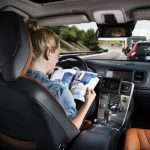 The widespread use of autonomous vehicles could provide either a significant reduction in greenhouse gas emissions, or it could see them rise significantly, with the outcome largely dependent on the public policy implemented during their rollout. That’s the finding of a recent study from Princeton University.
The widespread use of autonomous vehicles could provide either a significant reduction in greenhouse gas emissions, or it could see them rise significantly, with the outcome largely dependent on the public policy implemented during their rollout. That’s the finding of a recent study from Princeton University.
“We need fuel economy standards to ensure the cars are clean, and policies to encourage ridesharing to reduce vehicle miles traveled,” the authors explain.
The researchers discovered that if autonomous vehicles are well managed, then the benefits can be tremendous, whether in terms of higher mobility, reduced traffic congestion, better road safety or lower emissions and energy usage. If they’re managed badly however, all of those things could suffer.
Changes in mobility
The technology promises tremendous changes to how we travel, with the fact that passengers can relax or work en route significantly boosting the experience of travel. The technology needs careful management however to ensure that this doesn’t result in wasteful usage, with a particular risk of large numbers of vehicles traveling with no passengers in them.
“Two big changes are coming — automation and mobility as a service,” the authors say. “Depending on how they interact, and how clean the fuel is, it could really end up a lot better or worse off for the environment.”
The authors believe the best outcome will be secured when autonomous vehicles are deployed and managed in fleets rather than as the personal vehicles most cars are today. What’s more, these fleets should have rigorous fuel efficiency standards imposed upon them.
“Fleets are motivated to deliver as many person-miles out of each vehicle as they possibly can,” they explain. “If you’re getting two person-miles out of each vehicle-mile traveled (because there are two passengers in the vehicle), energy use and pollution are chopped in half, regardless of the fuel source.”
They believe that the policies surrounding autonomous vehicles will play a huge role in both how they operate, and the impact they have on society. For instance, they suggest that very expensive licenses to own such a vehicle could discourage individuals from buying an autonomous vehicle, whilst regulations could even go as far as to prevent such a sale from occurring.
It’s tempting to think that driverless cars are still many years away and therefore it’s an issue that doesn’t need thinking about at this juncture. The researchers urge policy makers not to fall into this trap however, and to ensure that policies and regulations exist to reduce any negative externalities from the technology, whilst ensuring the mobility advantages remain.
“We need public policy to ensure that we align the economic incentives with what we want from a societal perspective,” the authors conclude “It’s really up to us.”